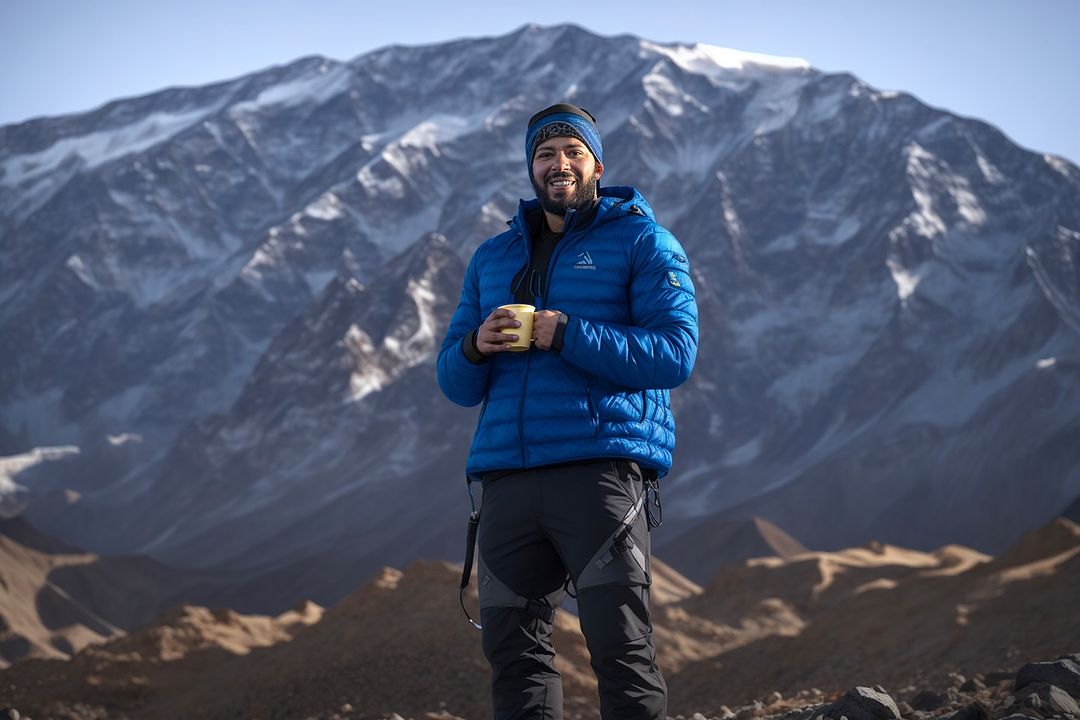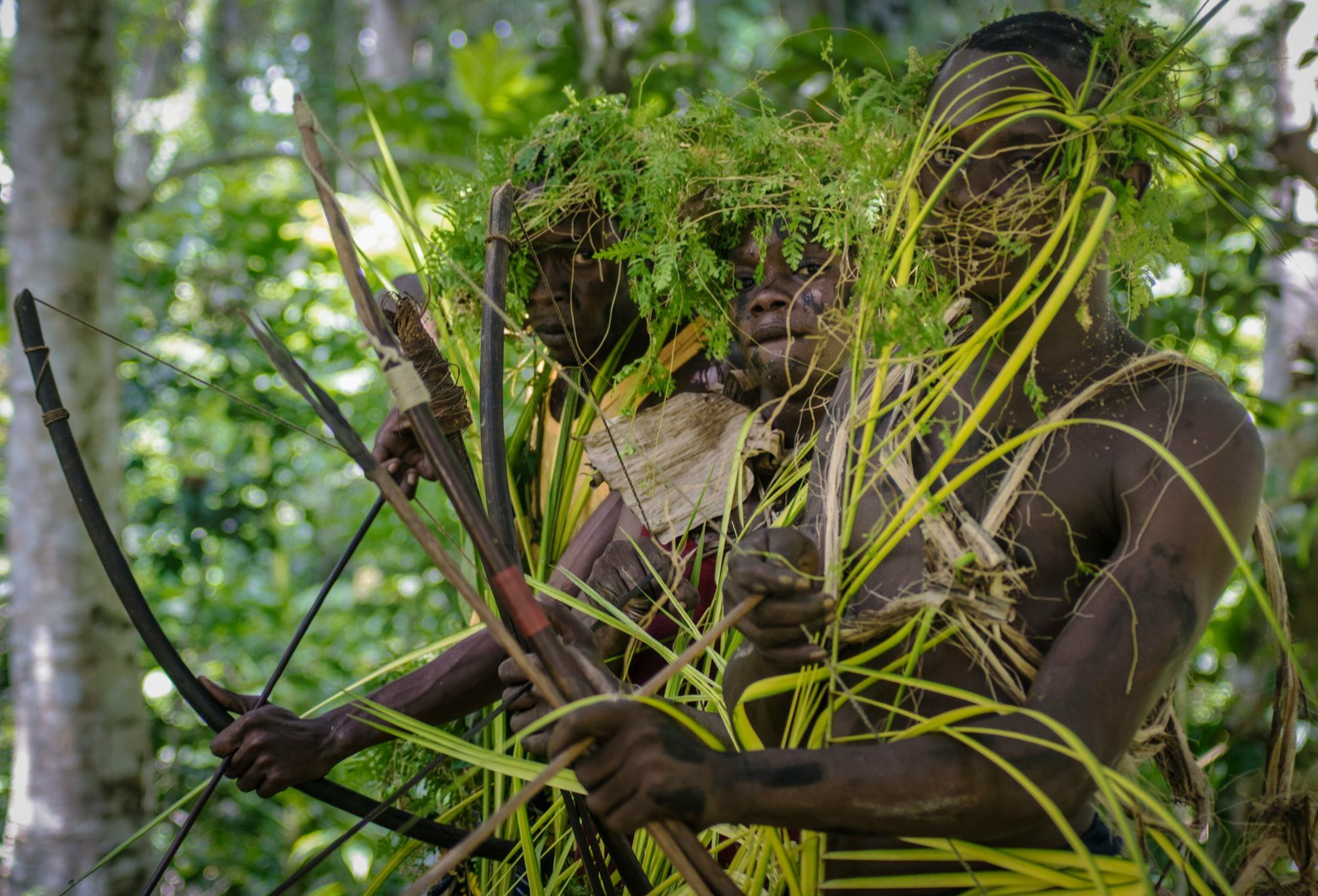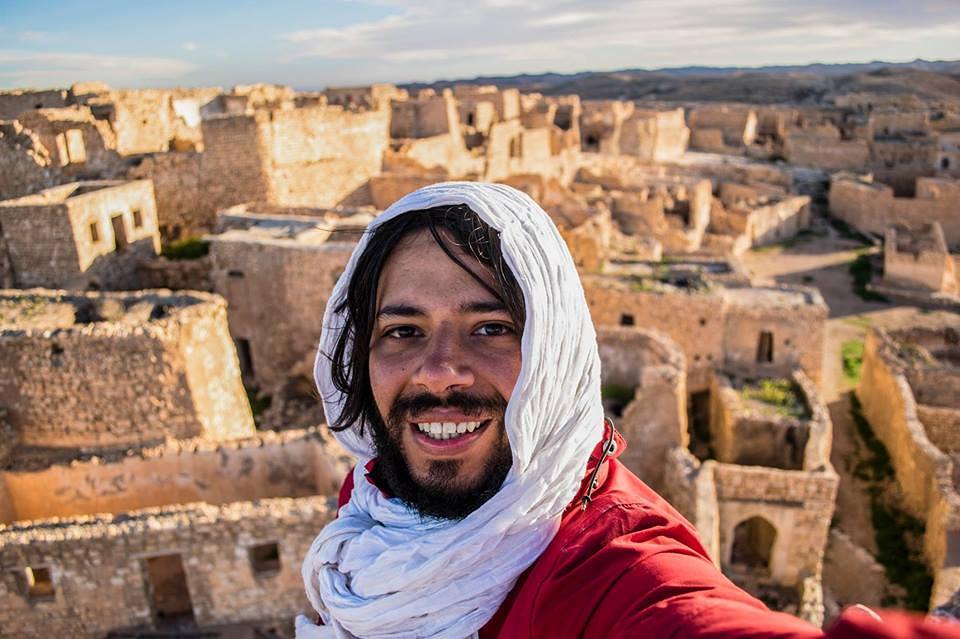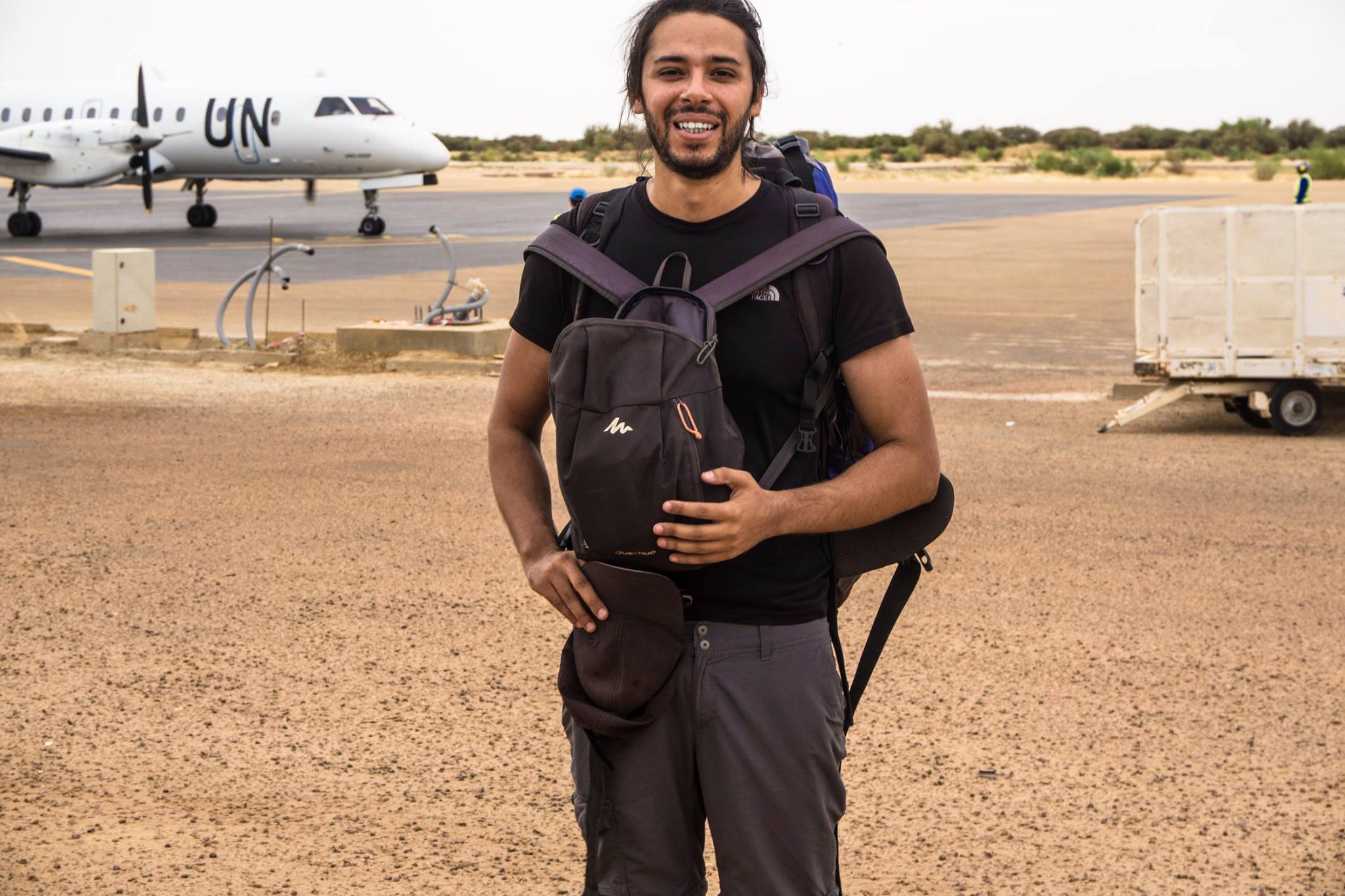Images credit to Mehdi Belhadj
It takes extraordinary courage to walk away from the comforts of secure employment and a daily routine in search of an exceptional life. The ranks of the overland community are filled with men and women who have chosen to turn their backs on comfort and mundanity and instead set off into the world to discover it for themselves on their own terms. Mehdi Belhadj, a Tunisian, is one such person, but where many chose to seek a sense of freedom by investing in a wheeled overland vehicle, Mehdi has chosen to travel by foot.

Equipped with only the absolute necessities, Mehdi has traveled the length and breadth of Africa, defying the odds to achieve his dream while proving that while Africa may be a continent facing extreme challenges and burdened by a turbulent history, it is also a continent of beauty, culture, and contrasts. Mehdi has been arrested, abducted, and plagued by malaria and typhoid, yet none of these challenges have broken his spirit; if anything, they have made him stronger, wiser, and more determined than ever. This is Mehdi’s story told in his own words (edited gently for improved legibility).

Tell us about yourself
My name is Mehdi Belhadj. I am 32 years old, an African blogger and traveler from Tunisia.
I graduated as an engineer and then worked for a short period until I discovered that every day was repetitive. So, I decided to get out of the circle of comfort and routine and learn from the school of life by traveling.
Since childhood, I have preferred to spend most of my vacation time in my grandparents’ village, far from the city, where there are fig fields, vineyards, olive orchards, and the ocean. From there, I grew up with a great attachment to and respect for nature. I am currently traveling in Saudi Arabia and continuing along the [African] mainland to return to Tunisia.

What motivates and inspires you to travel?
For me, traveling is a free lesson in life, sometimes through interesting experiences and happy endings and sometimes through the dangers and difficulties we face. From this, we learn more, and it provides us with valuable life lessons. What inspires me the most in my experience is the relationship between human beings and their surroundings.

Although the landscapes of many countries may be similar, the people remain different in their customs, traditions, and mentalities. The contact with all these races makes me feel that I have drunk so little from the river of knowledge, making me want to take more adventures and learn more about what this continent hides.
What is your life philosophy?
Nisargadatta Maharaj said, “Wisdom is knowing I am nothing, Love is knowing I am everything, and between the two, my life moves.”
How has traveling changed you?
This journey has changed my relationship with others, my relationship with my body, my vision of myself and the world, and my relationship with my family, friends, work, and money. Adventure and nature have changed my priorities in life.

Cold taught me the value of warmth; hunger taught me the value of food; thirst taught me the value of water; fatigue taught me the value of rest; and illness taught me the value of my health. I learned to enjoy every moment of my life, to free my madness, and to wake up every day as if I were born again.
What has surprised you the most about overland travel?
What always excites me is the amazing diversity of languages and cultures. Ivory Coast has over 78 spoken languages! When I cross a border, I wonder how a river or mountain can separate two groups of people and force them to live under different customs and laws.

What are your favorite destinations so far?
Almost all the countries I visited have offered inspiring adventures. These adventures include crossing the Ténéré between Niger, Algeria, and Libya on camels with Tuareg nomads, crossing the Congo River on the deck of a baleinière “death boat,” a traditional boat design from Lake Tanganyika, crossing the Mauritanian desert on the roof of the longest train in the world, and visiting the holy city Toba in Senegal during the African pilgrimage season with more than four million people.



I also attended the celebrations of the Ewe Kings, Voodoo and black magic shows in both Togo and Benin, spent time with the Sultan of Bauchi in Nigeria, and crossed the Atlantic Ocean towards the farthest islands (Annobon Island, São Tomé and Príncipe) via cargo ships. I then went on to ascend to the highest peaks of the continent in Tanzania, Algeria, Morocco, Ghana, Nigeria, Cameroon, Comoros, and other countries, as well as living with many different tribes such as Bantu, Hausa, Himba, Heroro, Bushmen, and Basotho.

How do you afford to travel?
This question is constantly repeated, and many people think that I come from a wealthy family and that my pocket is full of money. What not everyone knows is that when I set out on my trip, I sold all my possessions, and what I collected for this trip was barely enough to buy equipment and a camera (the rest of the money was stolen in Ghana after six months). I travel light with a tent, mattress, sleeping bag, waterproof jacket, camera, power bank, and clothes.

I would have stayed [home] if I had thought long and hard about collecting money for my journey. I focus instead on controlling my spending; for example, I eat local food or buy vegetables from local markets to cook. I use my tent as an alternative to expensive hostels, and I walk, hitchhike, and sometimes use public transport within cities. Most of the time, I sleep in the villages I pass through; I ask permission from the village chief or knock on one of the doors to find a place to set up my tent or to be hosted in one of the local houses.
But in the cities, when I have to obtain a new visa, for example, I sometimes spend a couple of nights in temples, police stations, service stations, or Couchsurfing, and many people, especially my followers, host me.

My only source of income now is working along the way. My professional future today is no longer linked to my academic degree. Adapting to changes and circumstances gave me more experience and freed me from the constraints of my degree, and I had to work repeatedly during my trip. For example, I worked as a fisherman in Senegal, a farmer in Ghana, a photographer in Mali, a store manager, and a building contractor in Burkina Faso. I also worked as a carpenter in the Democratic Republic of the Congo. These jobs were far from my field of specialization, but they proved that livelihoods exist when there is the will.

It was difficult to travel anywhere during the COVID-19 pandemic. Where were you at the time, how did you spend your time there, and how did the pandemic affect your style of travel?
The funny thing is that a little before the coronavirus period, I was kidnapped in the Democratic Republic of the Congo. When I was released, I discovered that all the border crossings were closed, and not only that, even movement between the provinces was forbidden. At that time, I was in a very small village, and I had to hide and flee towards the capital Kinshasa, crossing the Congo River. From there, I was finally able to find work until the border was re-opened.

During the first period, I worked near the Congolese border on the river separating the two countries. I watched the other side daily, waiting for the border to open again. When I heard the border was open, I collected my bag and set off for Zambia. On my first border crossing after the pandemic, I discovered things had changed entirely. Costs had almost doubled after the new procedures of the PCR testing and quarantine period, and not only that, even hitchhiking had become very difficult, as everyone was afraid of foreigners because they were a potential source of infection, and finding a place to sleep became a complex matter.
You have traveled to remote West African villages and been invited to several rituals with local communities. Can you tell us about one of these experiences?
One of the strangest customs I have seen is the Cult of Skulls among the Bamileke of Cameroon. A princess of one of the Bamileke tribes invited me to attend a celebration. I thought it was a wedding. But when I arrived, I found out that it was a party for the dead, where people sang, danced, and drank alcohol on the graves of the dead. The graves are then opened to extract the skulls.

Among the Bamileke, the corpse becomes the center of rituals aimed at preserving the memory of the deceased while removing the perishable flesh. At the end of a funeral, the cult of the skulls elevates the deceased to the status of ancestor and provides a place among the community of the living that the dead will never relinquish.
Can you elaborate on some of the dangerous situations you have faced during your travels?
In Ghana, I was attacked by a group of youths armed with knives, and they demanded that I hand them all my money. I had to work on a pineapple farm with a fishmonger until I could secure a small amount to cross the border towards Burkina Faso.

In Nigeria, I was imprisoned because I crossed from a closed border area, so they suspected that my visa was not valid. I was detained for five days until its validity was verified. The prison experience taught me that even in the most dangerous places, there is always some good, as the prisoners took care of me, were keen to protect me, provided a place to sleep inside the only room of the prison, and helped me manage my daily affairs there.
In the Democratic Republic of the Congo, I visited one of the remote tribes in the tropical forest. When I left for the village, soldiers from a local militia intercepted me and took me to their camp, where I was restricted and beaten, and they demanded that I contact my family to send money so that I could be released.
Traveling through West Africa can be extremely difficult, especially on foot. Did you experience any ailments while traveling?
It is normal to face diseases in an environment where nature and weather are completely different from what you are used to. West Africa is a fertile area for malaria, which is a disease that completely exhausted me, as well as typhoid, but medicines are available; malaria is not dangerous in the case of early diagnosis and prompt treatment. What makes it a deadly disease is that some families do not have enough money to buy treatment, so they are unfortunately forced to resort to traditional medicine to treat infants and children.

Are there any community resources that you rely on as a backpacker?
Unfortunately, I have been unable to secure corporate sponsorship, but I receive great support from the people I meet every day, as well as from my friends and followers on my social media accounts. They are my biggest motivation to keep going; thanks to them, I am where I am today.
If you are interested in supporting Mehdi along his travels, you can reach him on his social media pages listed here:
Instagram @mehdi.bel.hadj
Facebook: Mehdi Belhadj
YouTube: MehdiBelhadj

Read More: Practical Overland Knives : Buyers Guide
Our No Compromise Clause: We do not accept advertorial content or allow advertising to influence our coverage, and our contributors are guaranteed editorial independence. Overland International may earn a small commission from affiliate links included in this article. We appreciate your support.


